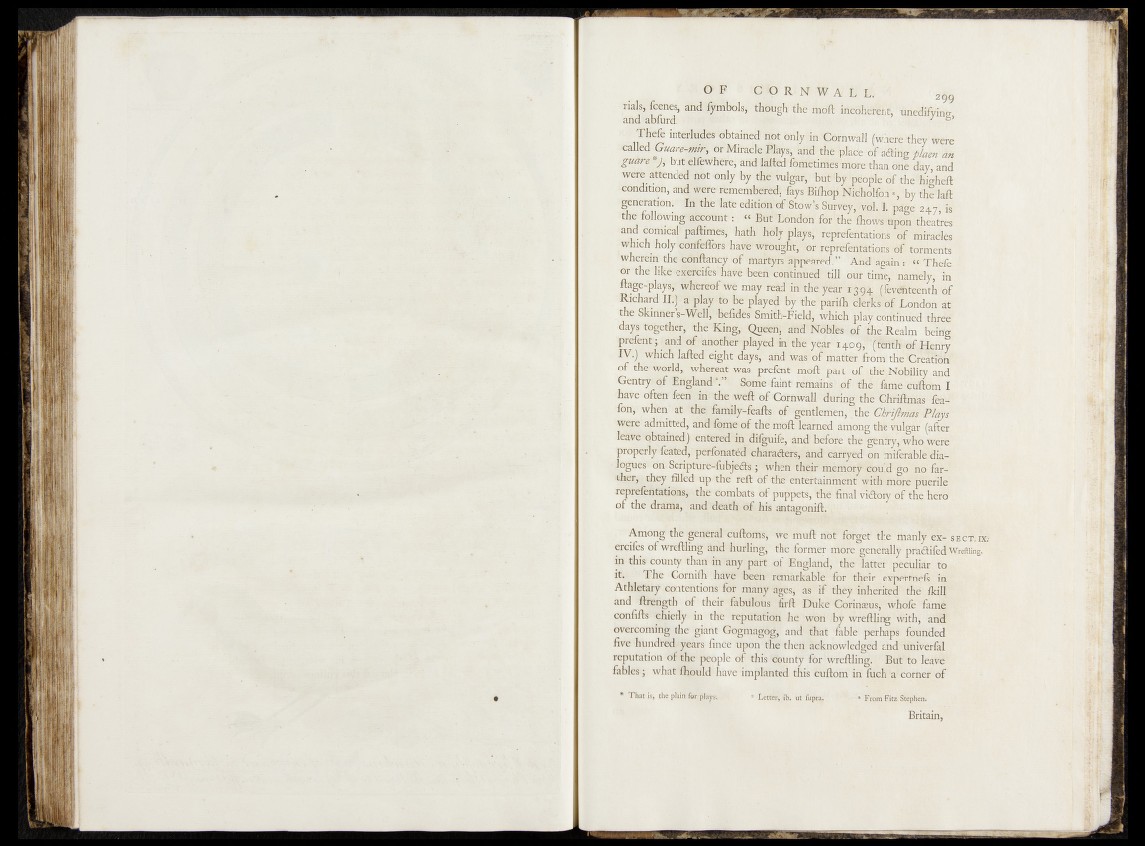
■ O F » R N W A L L , fi 2gg
riais, fcenes, ând/yriabols, though the moft incohérent^ unédiffW
andWiurd. raMp pi 4 1 1 3 °*
i ? ^ interludes obtained not only in Cornwall (where theywere
■ called Guare-M^, ôrMiraeleMays, and thë^kce of adting •/»&*» $$
”2 1 5 1 1 &fted ^^tiifiësTiiore than ôiiè dky arid
were amended I k ^ n ly bytH^Vulgkr, but ^ ^ l e ' d f thekigheft
•condition, and ^érè>rfemembtÉM Tays Bifhop Nidholfon'«',1 by t*he kft
'Çhéiaten. In the -lafte ediriAFof 'Stowk Sffr&y^Vol. ï. bjfge 2Æ 1S
fôllôwin^coén t : « Btfl*D6ndo'n for^he fhovrè Wpon^eafTes
and comical'/palmes, hath hc8y | k y s , 'repreferitatiori^ôf fniraëlès
which' holy -'crirfefes ha#vVtought, for' reprfeferitations 'of torments
wherfefe'thebÉriftaUcy of martyrs appeared.’’ And again: '^Thefe 1
or’fhe^ihéieMeifès'hà^è fôefeil'cànteéE» till o k time, nakdy, hi
flage-plays} wfereof^e may reàd in'tHè ^yèar 139 I (fevéfcVéenth ’of
•Richard II. p ÿ plapto be plàyed bÿ^he’pkîfh â è rW o f London ât
■ Skinner s-Well, kefîdés Smith-Field3 which jilâjr cotlünued three
da^.s to^eiher|i%é^Kmg, Qùeèri, arirNoMës p f j i e Réalm beiïfg
prefent1; J arid o f araoüher'pkÿëd 'in th}ê ^ ^ ^ ^ '( f tM h - d fH e n i y
IV*Hwhich laired eight days, and'W^of*maéèr fiôxriltlte^Craî^h
of the- world,, whereat was prefent moft part of , the; Nobility and
Gentry!8f "England'*.Sotiie faint remans' of the feme cüftom I
■ have often feen in the weft of Cornwall during the Chriftmas feau ;
when at r<the; fàmily-feafts o f gentlemen, .the Cbrijftttàs P là js'
Wefe arid'feme* of thë moft learned among thfe vulgar (after
lekve Obtained) entered in dhguile, and before die gentty, who were
properly {èâtêd, peffonatéd characters, and carryed pri tniferable dia-
when their1 lUemory*-could go 'no’ far-
t^ie^ _d ie7 filled up the reft of the entertainment with more puerile
repreforifations, the cc«nbats bf puppets, thê final victory of' the hero
of the drama, and death of- his antagonift.
Among the general cuftoms, we muft not* forget1' the manly exj^sicfi ix-
ércifes of wreftling and hurling, thé former more generally pradfifed Wreftling.
in this county than in any part o f England, the latter peculiar to
it. Thê CornHh 'haVd’ been remarkablefor their expdrtnefi in
Athletary contentions* for many ages, as if they inherited the /kill
and ftrength of their fabiilôus firft Duke Gorinaeus, whole famé
confifts chiefly in the reputation he won by wreftling vfith, and
overcoming the giant Gogmagég, and that fable perhaps founded
five hundred-years fince upon the then acknowledged and Üniverlàl
reputation rif the people of this 'cfounty fbr wreftling. But to leavë
fables ; what iihould have implanted this euftom in luch 'a* corner of
* That is, the plain for plays. 1 Letttrf-ib. ut fupra. ‘- ‘ From Fite Stephen.
Britain,